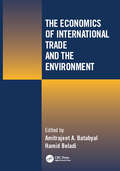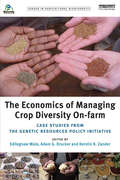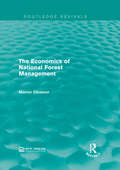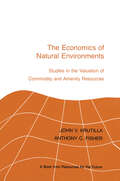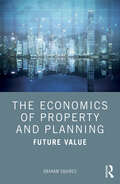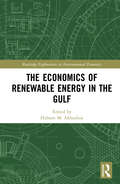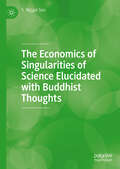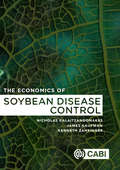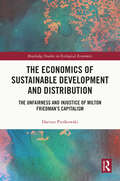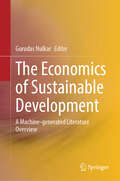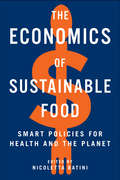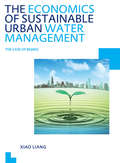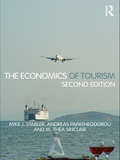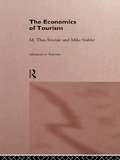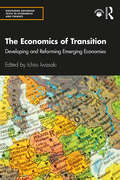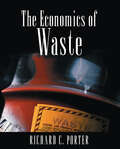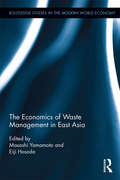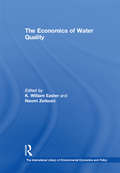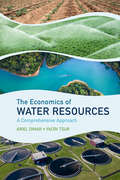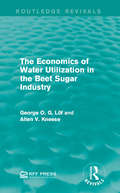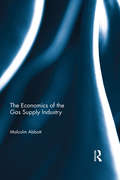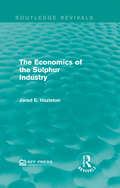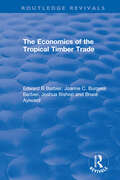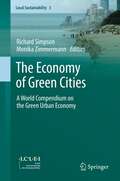- Table View
- List View
The Economics of International Trade and the Environment
by Amitrajeet A. Batabyal Hamid BeladiIssues related to environmental protection and trade liberalization have moved to the forefront of international policy agendas. The Economics of International Trade and the Environment explores - from an economic standpoint - many of the questions that are germane in increasing our knowledge of environmental policy in the presence of international
The Economics of Managing Crop Diversity On-farm: Case studies from the Genetic Resources Policy Initiative
by Edilegnaw WaleThe purpose of this book is to assess a variety of economic issues as they relate to agro-biodiversity and show how addressing these issues can assist in agro-biodiversity policy-making. This is illustrated using empirical data from some of the countries (Ethiopia, Nepal and Zambia) which are part of the Genetic Resources Policy Initiative. The empirical chapters apply the relevant economic methods, including regression analysis, choice experiments, hedonic pricing, contingent valuation and farm business income analysis. The authors discuss the economics of managing crop diversity on-farm in the context of crop variety attribute preferences, farmers' perception of agro-biodiversity loss, and value addition and marketing of the products of traditional crop varieties. The case studies include detailed analysis of traditional varieties of groundnut, maize, rice, sorghum, and teff. The results are relevant not only to GRPI countries but also to other countries concerned with the sustainable utilization of these resources. Overall, the studies illustrate how genetic resources issues can be integrated into rural development interventions.
The Economics of National Forest Management (Routledge Revivals)
by Marion ClawsonOriginally published in 1976, this title concentrates upon the management of national forests. Using the best data available, Marion Clawson considers all outputs of the national forests and all costs of national forest management to analyse forests from an economics perspective. The Economics of National Forest Management is ideal for policy makers, professional foresters, and students interested in environmental studies.
The Economics of Natural Environments: Studies in the Valuation of Commodity and Amenity Resources, revised edition
by John V. Krutilla Anthony C. FisherIn this pioneering study, Krutilla and Fisher put the amenity resources of natural environments into an analytical framework comparable to that for the extractive resources. The models and theoretical background of their techniques are illustrated by case studies which include the controversial Hells Canyon dam, the Mineral King ski resort, and the Trans-Alaska pipeline. The authors point out that resource development activities undertaken on public lands often receive financial advantages---preferential tax treatment, subsidized capital, and access to public resources---that are not taken into account in the costs of the project. True evaluation of the costs and benefits of a development project often tips the balance in favor of preserving an area in a natural state.
The Economics of Property and Planning: Future Value
by Graham SquiresThis book introduces the interlocking disciplines of property and planning to economic theory and practice. Unlike any other available textbook, The Economics of Property and Planning skilfully introduces the reader to the interplay between property and planning using an economic lens. As resources become scarce, there is a growing need for students to understand the principles of economics in property and planning, especially given the rapid social, environmental, technological, and political changes that are shaping places. The book begins with an outline of key economists and economic problems, then resources and scarcity, before examining macro- and microeconomic factors at play in property and planning. Furthermore, this book covers a variety of topics, including spatial and locational modelling, fiscal approaches to redistribution, regeneration and renewal, and transport and infrastructure financing. There is also a particular focus on contemporary issues such as climate change, environmental limits to economic growth, sustainability and resilience, and affordable housing. This book also introduces practical evaluation tools and appraisal, plus a look at property and planning with respect to macroeconomic objectives, policy, and new directions. With property and planning essential factors in economic thinking and doing, this book provides insight into what future places will look like in real terms and how they will be shaped by policy. Targeted disciplines for this book include Economics, Planning, Property, Construction, Geography, Environmental Management, Sustainability, Housing, Built Environment, Land Economy, Urban Studies, Regional Studies, and Public Policy.
The Economics of Renewable Energy in the Gulf (Routledge Explorations in Environmental Economics)
by Hisham M. AkhonbayThe Cooperation Council for the Arab States of the Gulf (GCC) has been at the epicenter of global energy markets because of its substantial endowment of hydrocarbons. Yet countries in the region have also stated their intent to be global leaders in renewable energy. This collection explores the drivers for the widespread adoption of renewable energy around the GCC, the need for renewable energy and the policy-economic factors that can create success. All six countries within the GCC have plans to include renewable energy power generation in their energy mix for various reasons including: a growing demand for electricity because of increasing populations, an increasing government fiscal deficit due to inefficient subsidies, the need to diversify the economy and global pressure to meet climate change requirements. However, the decision of when and by how much to introduce renewable energy is fraught with complications. In this book, a stellar cast of regional policy and academic experts explore the reasons behind these renewable energy plans and the potential impediments to success, whether it be the declining cost of producing energy from hydrocarbons, an infrastructure which needs to be updated, social acceptance, lack of financing and even harsh weather. Weighing up all these factors, the book considers the route forward for renewable energy in the Gulf region. The Economics of Renewable Energy in the Gulf offers an excellent examination of the adoption of renewable energy in the area. It will be of great interest to academic researchers and policy makers alike, particularly those working in the areas of energy economics, public policy and international relations.
The Economics of Singularities of Science Elucidated with Buddhist Thoughts
by S. Niggol SeoThis book analyses the unprecedented economic and social challenges to human civilization from the perspective of Buddhist philosophy. It reviews singularities in a broad range of scientific experiments, including the theory of relativity, quantum physics, artificial intelligence, mRNA virology, stem cell biology, and neuroscience to evaluate catastrophic risks posed to the present global economic and environmental order. Through placing these discussions within the context of Buddhist philosophy, an alternative to traditional economic and science ideas is presented. The power of technological progress and associate risks is highlighted as a way of looking into and creating a more sustainable future. This book provides a fresh interpretation of fat-tail economics that draws ideas from the basic sciences. The book will be of much value to students and researchers who are keen to environmental economics, planetwide catastrophes, and Buddhist philosophy.
The Economics of Soybean Disease Control
by Nicholas Kalaitzandonakes James Kaufman Kenneth ZahringerWorldwide soybean crop yields can achieve USD$130 billion per year in farm-level sales, but around 13% of these yields are lost to disease. Effective disease management could generate significant economic benefits, and while disease management strategies do exist, their application remains limited among producers, often due to an incomplete understanding of disease incidence and severity, as well as perceived complexities of these strategies and a lack of information regarding success rates. This book presents an economic perspective on disease control, with an emphasis on producer choice among alternative technologies and potential changes in cropping systems. It provides an overview of global soybean diseases, their economic significance and management, and covers farm-level decision making, economic payoffs of alternative disease practices and key uncertainties. The book also outlines a global economic model that evaluates disease distribution and management implications. Key features include: - Extensive empirical case studies of soybean disease control, offering strategies for economically optimal management of diseases such as soybean seedling disease and root rot. - Analysis of economic factors to guide farm-level decision making. - Consideration of new technologies in disease management and their potential market-level impacts. This text is recommended for students and researchers in plant pathology and agricultural economics, as well as professionals in the soybean production industry.
The Economics of Soybean Disease Control
by Nicholas Kalaitzandonakes James Kaufman Kenneth ZahringerWorldwide soybean crop yields can achieve USD$130 billion per year in farm-level sales, but around 13% of these yields are lost to disease. Effective disease management could generate significant economic benefits, and while disease management strategies do exist, their application remains limited among producers, often due to an incomplete understanding of disease incidence and severity, as well as perceived complexities of these strategies and a lack of information regarding success rates. This book presents an economic perspective on disease control, with an emphasis on producer choice among alternative technologies and potential changes in cropping systems. It provides an overview of global soybean diseases, their economic significance and management, and covers farm-level decision making, economic payoffs of alternative disease practices and key uncertainties. The book also outlines a global economic model that evaluates disease distribution and management implications. Key features include: - Extensive empirical case studies of soybean disease control, offering strategies for economically optimal management of diseases such as soybean seedling disease and root rot. - Analysis of economic factors to guide farm-level decision making. - Consideration of new technologies in disease management and their potential market-level impacts. This text is recommended for students and researchers in plant pathology and agricultural economics, as well as professionals in the soybean production industry.
The Economics of Sustainable Development and Distribution: The Unfairness and Injustice of Milton Friedman’s Capitalism (Routledge Studies in Ecological Economics)
by Dariusz PieńkowskiDrawing on a broad transdisciplinary background, this book compares distributive justice systems and related socioeconomic institutions within the liberal and sustainable development traditions. Confronting the capitalist worldview of prominent Nobel Prize–winning economist Milton Friedman, the book offers a theoretical framework for sustainable development: a new paradigm of economics grounded in environmental and social issues. The analysis takes as its starting point that the development and evolution of human beings is codetermined by socioeconomic institutions. These institutions facilitate models of society, morality and human behaviour: they are all social constructs. This matters because the liberal system of justice uses the claim that ‘life is unfair’ as the justification of socioeconomic inequalities, and it is these institutions which determine the concepts of fairness and justice. Therefore, the liberal system’s favouring of entrepreneurs should require advance measures to safeguard the interests of the losers—instead, it seeks to justify their misfortunes. It is argued that this liberal notion of fairness can only be fairly executed in conditions of perfect market competition, which have never existed. In contrast, the principles of sustainable development pay attention to the problems generated by the unjust and unfair distribution of resources and postulate wider use of the fairness formula ‘to each according to their needs’. It is thus more focused on fair ends than on fair procedures. This book is addressed to scholars and advanced students in ecological economics, environmental economics, economics of sustainable development and political science.
The Economics of Sustainable Development: A Machine-generated Literature Overview
by Gurudas NulkarThis book is a machine-generated literature overview that explores the interlinkages between communities, both rural and urban, and how they are dependent on natural resources and ecosystem services for livelihoods. With increasing urbanization and changing land use, sourcing food, fuel, and other basic needs from forests and grasslands is turning into a significant challenge, especially in the developing world where they have to balance regional aspirations against the environmental impact and legacy for forthcoming generations. As sources of sustainable livelihoods decline, it affects their ability to overcome poverty. Furthermore, economic impacts on the natural capital can undermine the long-term sustainability of communities, and negatively affect their health and well-being.To ensure economic growth and sustainable livelihoods, it is imperative to rethink how economic growth and agriculture can reduce their impacts on the natural environment. How dowe integrate economic, social, and environmental aspects into our economy? The book will discuss aspects of sustainable consumption, conservation of ecosystems and biodiversity, and making rural communities resilient to the impacts of climate change. By recognizing the economic value of ecosystem services, decision-makers can better understand the benefits and costs of different land uses and resource management practices and make more informed choices that promote sustainable livelihoods and natural capital conservation. The book will be a great resource for policy-makers, students of economics and sustainable development, non-governmental organizations working in this field, and corporate managers who are responsible for allotting budgets towards corporate social responsibility programs.^
The Economics of Sustainable Food: Smart Policies for Health and the Planet
by Nicoletta BatiniProducing food industrially like we do today causes tremendous global economic losses in terms of malnutrition, diseases, and environmental degradation. But because the food industry does not bear those costs and the price tag for these losses does not show up at the grocery store, it is too often ignored by economists and policymakers.The Economics of Sustainable Food details the true cost of food for people and the planet. It illustrates how to transform our broken system, alleviating its severe financial and human burden. The key is smart macroeconomic policy that moves us toward methods that protect the environment like regenerative land and sea farming, low-impact urban farming, and alternative protein farming, and toward healthy diets. The book's multidisciplinary team of authors lay out detailed fiscal and trade policies, as well as structural reforms, to achieve those goals.
The Economics of Sustainable Urban Water Management: UNESCO-IHE PhD Thesis
by Xiao LiangRapid population growth, limited water availability, climate variability and environmental pollution together cause a significant challenge to provide sufficient water to urban residents in a sustainable and effective way. Advanced water treatment technology can contribute to the solution of problems physically, but it may not ensure sustainable op
The Economics of Tourism
by Mike J. Stabler Andreas Papatheodorou M. Thea SinclairThis new edition of The Economics of Tourism reflects the tremendous changes that have occurred in the tourism sector in the last twelve years. It recognizes that the nature of tourism demand and supply is being transformed by innovations in information communication technologies, market liberalization and climate change. Paralleling this, there is much greater interest in the study of tourism by both students and researchers in mainstream economics. The text is now in four parts covering: demand; supply; national, regional and international matters and environmental issues. The concluding chapter appraises the state of the economic research into tourism. The increased interest in tourism has engendered the development of new methods of analysis and the refinement of established ones. Accordingly, the book has been extensively restructured, revised and expanded with two new chapters: chapter six of the first edition is now broken down into two and a new chapter has been added on environmental issues to take account of new developments, critically review the associated literature and consider future trends in tourism economics research. The reader-friendliness of the book has also been enhanced in various ways, such as the extensive chapter cross-referencing to refresh the reader’s memory and the inclusion of a detailed list of abbreviations. The Economics of Tourism will continue to make accessible for the non-specialist, the application and relevance of economics to tourism. Extensively revised and updated, including research and case studies the textbook will be an indispensable resource for both students and researchers.
The Economics of Tourism (Routledge Advances In Tourism Ser.)
by M. Thea Sinclair Mike StablerMakes a key contribution from an economic standpoint to the understanding of tourism. Examining such issues as how tourism firms operate in national and global contexts, the effects of tourism on destination areas, the demand for tourism, and the interaction between tourism and natural environments, this comprehensive introduction explains how econ
The Economics of Transition: Developing and Reforming Emerging Economies (Routledge Advanced Texts in Economics and Finance)
by Ichiro IwasakiIn the last three decades since the fall of the Berlin Wall, there has been a vast amount of study looking at transforming the planned economy to a market economy from both theoretical and empirical aspects. This book provides an overview and insight into transition economies in the recent decades and looks at key economics topics from the so-called “transition strategy debate” to environmental reform. The book also includes an analytical review and meta-analysis of the existing literature. By integrating theoretical discussions and synthesizing empirical findings in a systematic manner, this book may help to enlighten the debate on the timing, speed, and policy sequence of economic transition. The book will particularly appeal to researchers, policy makers, other practitioners, and under- and post-graduate students who are interested in transition economies in Eastern Europe, the former Soviet Union, Southeast Asia, and China. It aims to be read as an advanced reader.
The Economics of Waste (Rff Press Ser.)
by Richard C. PorterIn this concise, engaging, and provocative work, Richard Porter introduces readers to the economic tools that can be applied to problems involved in handling a diverse range of waste products from business and households. Emphasizing the impossibility of achieving a zero-risk environment, Porter focuses on the choices that apply in real world decisions about waste. Acknowledging that effective waste policy integrates knowledge from several disciplines, Porter focuses on the use of economic analysis to reveal the costs of different policies and therefore how much can be done to meet goals to protect human health and the environment. With abundant examples, he considers subjects such as landfills, incineration, and illegal disposal. He discusses the international trade in waste, the costs and benefits of recycling, and special topics such as hazardous materials, Superfund, and nuclear waste. While making clear his belief that not every form of waste presents the same amount of risk, Porter stresses the need for open-minded approaches to developing new policies. For students, policymakers, and general readers, he provides insight and accessibility to a subject that others might leave out-of-sight, out-of-mind, or buried under an impenetrable prose of statistics and jargon.
The Economics of Waste Management in East Asia (Routledge Studies in the Modern World Economy)
by Masashi Yamamoto Eiji HosodaThe existing literature provides very little information on the real and current process of waste disposal and recycling in China. China generates large amount of waste and it covers about 20 % of the world waste trade. This book focuses on China’s waste management and recycling policy. The book also examines the relationship between China’s waste management and recycling industry and its legal structure. It fills in the gap by providing insight into topics on how to resolve China’s waste management and recycling problems, theories and empirical studies on waste and management as well as waste management policies in East Asia. It also includes comparative analysis through case studies on other Asian countries such as Thailand and Japan.
The Economics of Water Quality (The International Library of Environmental Economics and Policy)
by Naomi ZeitouniThis volume brings together a number of prominent economic studies all of which deal with key water quality issues. The studies focus on the economic aspects of water quality including identifying the polluters' actions and incentives, designing and comparing control mechanisms, analyzing the costs and benefits of water quality programmes, and finally managing transboundary water quality. They all make recommendations for improving water quality through changing incentives, programmes and/or policies.
The Economics of Water Resources: A Comprehensive Approach (Natural Resource Management And Policy Ser. #24)
by Ariel Dinar Yacov TsurPopulation growth and rising living standards, on the one hand, and changing climate, on the other hand, have exacerbated water scarcity worldwide. To address this problem, policymakers need to take a wide view of the water economy – a complex structure involving environmental, social, economic, legal, and institutional aspects. A coherent water policy must look at the water economy as a whole and apply a comprehensive approach to policy interventions. Written by two of the world's leading scholars on economics of water, this is the first graduate-level textbook on the topic. The book discusses water resource management within a comprehensive framework that integrates the different, yet highly entwined, elements of a water economy. It follows the steps needed to develop a well-designed set of policies based on detailed analyses of intervention measures, using multi-sectoral and economy-wide examples from a variety of locations and situations around the world.
The Economics of Water Utilization in the Beet Sugar Industry (Routledge Revivals)
by Allen V. Kneese George O. LöfOriginally published in 1965, this case study of the beet sugar industry undertaken by George O. G. Lof and Allen V. Kneese illustrates the economic importance of water to industry. This study delves into the history and technology of the beet sugar industry to demonstrate the economic impact of the water environment and how water waste can be reduced in other industries. This title will be of interest to students of environmental studies.
The Economics of the Gas Supply Industry
by Malcolm AbbottIn recent years, natural gas has become a major source of energy, with trade across borders increasing through both pipelines and as Liquefied Natural Gas (LNG). Owing to this global development, this book traces the development of the gas supply industry, from localised to national industries and national industries to a major global industry. It looks at the basic economics and origins of the industry, as well as the role of the government in its development and relation to international markets. The book highlights certain economic characteristics such as the industry’s vertical and horizontal structure, the composition of consumer demand and the role of government in safety, planning and investment. With the understanding of the industry's long term development, the book helps to illustrate the relationship between natural gas producers and importers of LNG. This book would be of interest to scholars majoring in resource economics and energy economics, as well as to international practitioners in the natural gas market.
The Economics of the Sulphur Industry (Routledge Revivals)
by Jared E. HazletonBetween the 1950’s and 1970’s, the Sulphur industry continued to grow despite occasional shortages and excesses. In this study originally published in 1970, Hazleton focuses on the Frasch sulphur industry to explore issues such as competing sources of sulphur, the possibilities of sulphur being obtained as a result of pollution-abating policies and the conditions under which future supplies are likely to become available. This title will be of interest to students of Environmental Studies.
The Economics of the Tropical Timber Trade (Routledge Revivals)
by Joshua Bishop Edward B Barbier Joanne C. Burgess Barbier Bruce AylwardOriginally published in 1994, The Economics of the Tropical Timber Trade provides a detailed analysis of the economic linkages between the trade and forest degradation. Based on a report prepared for the ITTO, it looks current and future market conditions at the time of publication, and assesses the impacts on current and future market conditions, and assesses the impacts on tropical forests of both the international timber trade and domestic demand. The authors examine the causes of deforestation and compare the environmental impacts of the timber trade with other factors, such as the conversion of the forests to agriculture. Finally, they assess the national and international trade policy options, and discuss the potential role of interventions in the international timber trade in promoting efficient and sustainable use of forest resources. The book will be of interest to those concerned with forest management and policy, trade and environment, and with the economics of conversation and resource use.
The Economy of Green Cities: A World Compendium on the Green Urban Economy
by Monika Zimmermann Richard SimpsonThis volume bridges the gap between the global promotion of the Green Economy and the manifestation of this new development strategy at the urban level. Green cities are an imperative solution, not only in meeting global environmental challenges but also in helping to ensure socio-economic prosperity at the local level.
